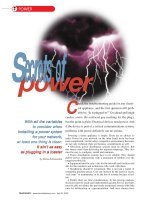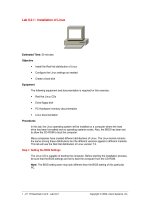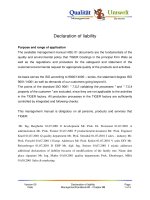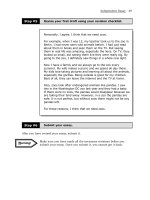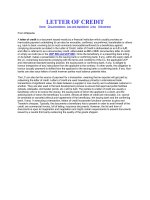Tài liệu Stages of writing ppt
Bạn đang xem bản rút gọn của tài liệu. Xem và tải ngay bản đầy đủ của tài liệu tại đây (148.86 KB, 13 trang )
Stages of writing:
1: Develop your topic:
If a topic is not assigned, identify a subject that interests you.
Refer to your text book, a lecture, a hobby you have that relates to the subject, something
that you are curious about.
Set your topic
State your thesis, theme, or objective in a sentence or two at most:
If the topic is assigned, or when you have identified your subject:
• Note key ideas or words you think will be important.
Use only short phrases or individual words at this point
Construct a map using these words and phrases
Refer to our Guide on concept mapping on how to create one
• Identify what you want to do with the concepts!
Refer to our list of terms for essays
Pick a likely verb (or two) and write out the definition to keep before you.
Are you to develop a persuasive or expository essay, or a position paper?
What has the teacher assigned?
• List out what sources you will need
to find information for your essay:
Start small: what does an encyclopedia say about it?
Is there a reference librarian who can help you find sources, both for an overview
and for detailed research?
Is a search engine enough? Or too boring?
Think big: are there experts you can talk to? an organization?
• Analyze your topic so far
Is it too vague or broad, or too narrow?
Is it interesting enough? Is there a controversy to explore, or do you think you can
help others understand a problem? Will you provide information from two points of
view, or only one while anticipating questions and arguments?
• Summarize your topic
and present it to your teacher for feedback.
Bring these first few steps with you in case the teacher will want to help you refine
or restate your topic
• Write out your opinion on, or approach to, the topic
Remember: you are writing an essay as a learning experience and you may find
information that is against your position. You will need to resolve this.
• Keep an open or critical mind as you research:
You may only see your side and not be objective.
Your position could be prejudicial to, or otherwise affect, your investigation
If a topic is not assigned, identify a subject that interests you.
Refer to your text book, a lecture, a hobby you have that relates to the subject, something
that you are curious about.
Set your topic
State your thesis, theme, or objective in a sentence or two at most:
If the topic is assigned, or when you have identified your subject:
• Note key ideas or words you think will be important.
Use only short phrases or individual words at this point
Construct a map using these words and phrases
Refer to our Guide on concept mapping on how to create one
• Identify what you want to do with the concepts!
Refer to our list of terms for essays
Pick a likely verb (or two) and write out the definition to keep before you.
Are you to develop a persuasive or expository essay, or a position paper?
What has the teacher assigned?
• List out what sources you will need
to find information for your essay:
Start small: what does an encyclopedia say about it?
Is there a reference librarian who can help you find sources, both for an overview
and for detailed research?
Is a search engine enough? Or too boring?
Think big: are there experts you can talk to? an organization?
• Analyze your topic so far
Is it too vague or broad, or too narrow?
Is it interesting enough? Is there a controversy to explore, or do you think you can
help others understand a problem? Will you provide information from two points of
view, or only one while anticipating questions and arguments?
• Summarize your topic
and present it to your teacher for feedback.
Bring these first few steps with you in case the teacher will want to help you refine
or restate your topic
• Write out your opinion on, or approach to, the topic
Remember: you are writing an essay as a learning experience and you may find
information that is against your position. You will need to resolve this.
• Keep an open or critical mind as you research:
You may only see your side and not be objective.
Your position could be prejudicial to, or otherwise affect, your investigation
If a topic is not assigned, identify a subject that interests you.
Refer to your text book, a lecture, a hobby you have that relates to the subject, something
that you are curious about.
Set your topic
State your thesis, theme, or objective in a sentence or two at most:
If the topic is assigned, or when you have identified your subject:
• Note key ideas or words you think will be important.
Use only short phrases or individual words at this point
Construct a map using these words and phrases
Refer to our Guide on concept mapping on how to create one
• Identify what you want to do with the concepts!
Refer to our list of terms for essays
Pick a likely verb (or two) and write out the definition to keep before you.
Are you to develop a persuasive or expository essay, or a position paper?
What has the teacher assigned?
• List out what sources you will need
to find information for your essay:
Start small: what does an encyclopedia say about it?
Is there a reference librarian who can help you find sources, both for an overview
and for detailed research?
Is a search engine enough? Or too boring?
Think big: are there experts you can talk to? an organization?
• Analyze your topic so far
Is it too vague or broad, or too narrow?
Is it interesting enough? Is there a controversy to explore, or do you think you can
help others understand a problem? Will you provide information from two points of
view, or only one while anticipating questions and arguments?
• Summarize your topic
and present it to your teacher for feedback.
Bring these first few steps with you in case the teacher will want to help you refine
or restate your topic
• Write out your opinion on, or approach to, the topic
Remember: you are writing an essay as a learning experience and you may find
information that is against your position. You will need to resolve this.
• Keep an open or critical mind as you research:
You may only see your side and not be objective.
Your position could be prejudicial to, or otherwise affect, your investigation
2: Identìfy your audience
Some ways of thinking of audience
• You are selling a product:
what style of writing will appeal to them?
• You are explaining a sport:
how would your vocabulary change if your audience were children?
visitors from another country? your parents?
• Are you documenting an event:
how would you detail the facts of a crime you witnessed?
Categories of audience:
• Is it simply a broad range of ages, education level, etc.?
• Is it your instructor who grades you or a teaching assistant? fellow students?
Professionals?
• Is there a sub-category to consider?
For example, your teammates, or those you want to interest in your sport?
• What is the background of your audience?
For example, you would write differently and use different vocabulary for a
scientist than a playwright, a businessman than a athlete.
• Establish the type of writing that will be most effective in communicating.
c.f. writing types in the Writing Guides index
• Consider point of view or narrative types
c.f. reading fiction
• Consider the most effective tone to take that matches your purpose
c.f. Capital Community College: Tone: A Matter of Attitude
3: Research:
Develop your time line
Allow for editing, revision and unexpected developments
• Inspiration phase:
This is continuous to prevent losing ideas and inspirations
Keep a convenient place to preserve phrases, vocabulary, events, etc. for later use
• Research phase; information gathering and recording:
See below
• Organizing/prewriting phase
with concept mapping, outlining, even brainstorming
Determine how you will build the scenes of your argument, narrative, story, etc.
See our definitions of writing terms in our Guides.
Research phase; information gathering and recording:
Document all interviews, readings, experiments, data, websites, reports, etc.
People: instructor, teaching assistant, research librarian, tutor, subject matter experts,
professionals
1. Develop research strategies and a list of resources
2. Narrow your topic and its description; pull out key words and categories
Develop a list of key words--50 or so--that form the foundation of both your
research and writing. Build the list from general sources and overviews
3. Bring your topic and keyword list to a local research librarian, teacher,
support professional on resources available
Text books (!), reference works, web sites, journals, diaries, professional reports
4. International conventions of copyright govern the use and reproduction of all
material: all information should be properly cited
c.f. our guide on citing websites for models
What are some resources?
• Search engines
c.f. Search Engine Colossus with links to search engines from 148 countries
• Directories and portals on the Internet that categorize/organize information
and links
c.f. Open Directory Project; Librarians Index to the Internet; Infomine
• Web sites devoted to particular topics, including text, graphics, movies, music
files
e.g. Internet Directory for Botany
• Government documents, forms, laws, policies, etc.
c.f. U.S. Government Printing Office disseminates official information from all three branches of
the United States Federal Government
• Services and information by
non-profit organizations and by for-profit businesses
• LISTSERVs or discussion groups
c.f. L-Soft "the official catalog of LISTSERV
®
lists"
• Resources at your local (public) library
These may require membership or registration
• Newspaper, journal, magazine databases
Often restricted to subscribers, require registration, or can be fee-based for access
Using an Internet search engine:
Find the best combination of key words to locate information you need;
Enter these in the search engine
• Refer to known, recommended, expert, or reviewed web sites
• Review the number of options returned.
If there are too many web sites, add more keywords.
If there are too few options, narrow/delete some keywords,
or substitute other key words


